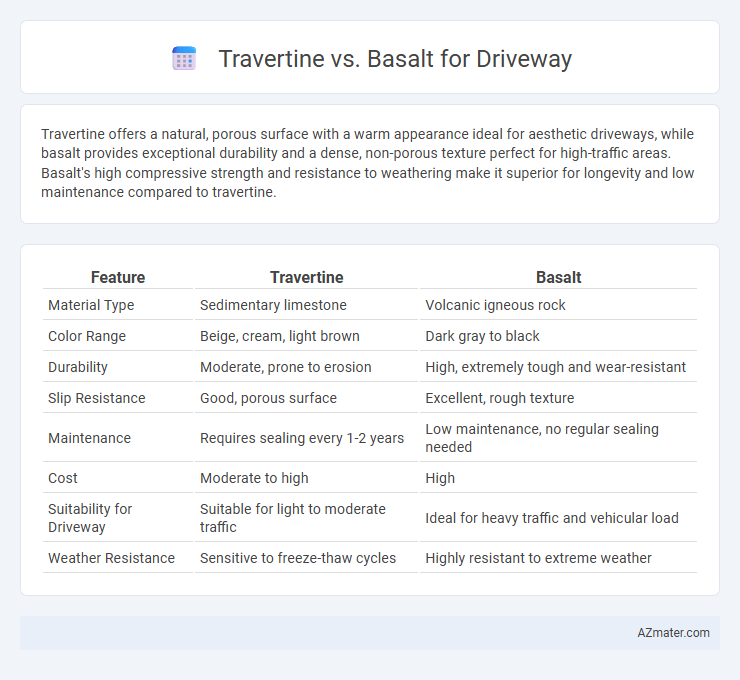Travertine offers a natural, porous surface with a warm appearance ideal for aesthetic driveways, while basalt provides exceptional durability and a dense, non-porous texture perfect for high-traffic areas. Basalt's high compressive strength and resistance to weathering make it superior for longevity and low maintenance compared to travertine.
Table of Comparison
| Feature | Travertine | Basalt |
|---|---|---|
| Material Type | Sedimentary limestone | Volcanic igneous rock |
| Color Range | Beige, cream, light brown | Dark gray to black |
| Durability | Moderate, prone to erosion | High, extremely tough and wear-resistant |
| Slip Resistance | Good, porous surface | Excellent, rough texture |
| Maintenance | Requires sealing every 1-2 years | Low maintenance, no regular sealing needed |
| Cost | Moderate to high | High |
| Suitability for Driveway | Suitable for light to moderate traffic | Ideal for heavy traffic and vehicular load |
| Weather Resistance | Sensitive to freeze-thaw cycles | Highly resistant to extreme weather |
Introduction to Travertine and Basalt Driveways
Travertine driveways offer a natural, porous stone surface known for its warm beige tones, durability, and slip-resistant texture, making it ideal for residential paths and driveways. Basalt driveways feature a dark, dense volcanic rock with exceptional hardness and weather resistance, providing a modern, sleek appearance that withstands heavy traffic and harsh climates. Both materials combine aesthetic appeal with functional strength, but travertine emphasizes elegance and natural variation, while basalt prioritizes toughness and longevity.
Key Differences Between Travertine and Basalt
Travertine is a porous, sedimentary stone with a textured surface and warm, earthy tones, making it slip-resistant and aesthetically appealing for driveways. Basalt is an igneous rock known for its dense, hard structure and dark, uniform color, offering superior durability and resistance to wear under heavy traffic. The key differences lie in travertine's natural fissures and lighter weight versus basalt's solidity and better ability to withstand extreme weather conditions.
Appearance and Aesthetic Appeal
Travertine offers a warm, natural look with its porous texture and earthy tones ranging from cream to rust, creating a classic Mediterranean aesthetic ideal for elegant driveway designs. Basalt showcases a sleek, modern appearance with its dense, fine-grained structure and rich dark gray to black hues, providing a bold contrast and contemporary style. Choosing between travertine and basalt depends on desired aesthetic impact, where travertine emphasizes softness and warmth, while basalt conveys sophistication and durability.
Durability and Longevity Comparison
Travertine and basalt both offer excellent durability for driveways, with basalt providing superior hardness and resistance to wear due to its igneous volcanic origin. Basalt's dense, fine-grained structure ensures exceptional longevity and minimal maintenance, making it ideal for high-traffic areas. Travertine, while durable and aesthetically appealing with its porous calcite composition, may require sealing to protect against staining and weathering over time.
Slip Resistance and Safety
Travertine offers exceptional slip resistance due to its naturally porous and textured surface, making it a safe choice for driveway applications prone to wet conditions. Basalt, a dense volcanic rock, provides moderate slip resistance but can become slippery when polished or wet, necessitating surface treatments for enhanced safety. Prioritizing slip resistance, travertine is generally favored for driveways where safety is a critical concern, especially in climates with frequent rain or ice.
Maintenance Requirements
Travertine driveways require regular sealing and occasional cleaning to prevent staining and weather damage, especially in areas with heavy rainfall or freeze-thaw cycles. Basalt driveways offer lower maintenance due to their dense, non-porous nature, resisting stains and erosion with minimal upkeep. Choosing basalt reduces long-term maintenance costs associated with sealing and repairs compared to the more porous travertine surface.
Cost and Budget Considerations
Travertine driveways typically cost between $15 to $30 per square foot, offering a mid-range option with elegant aesthetics and moderate durability. Basalt, being denser and more durable, usually commands a higher price range of $20 to $40 per square foot, which can significantly impact budget planning for large driveway projects. When considering long-term maintenance and replacement costs, basalt's resilience may justify the initial investment despite its higher upfront cost compared to travertine.
Installation Process and Challenges
Travertine driveways require careful cutting and sealing to prevent water absorption and staining, with installation involving precise leveling to avoid uneven surfaces. Basalt, being denser and harder, demands specialized tools for cutting and can pose challenges in achieving a smooth finish due to its natural toughness. Both materials necessitate skilled labor to ensure proper alignment and durability, but basalt's weight and hardness often increase installation time and complexity.
Climate Suitability and Weather Resistance
Travertine offers excellent climate suitability for warm, dry regions due to its natural porosity, which aids in heat dissipation but may require sealing to prevent water absorption in wetter climates. Basalt is highly weather-resistant, making it ideal for areas with heavy rainfall, freezing temperatures, and frequent freeze-thaw cycles, thanks to its dense, non-porous composition. When selecting between travertine and basalt for a driveway, consider local climate conditions: basalt better withstands extreme weather, while travertine performs well in moderate, dry environments with proper maintenance.
Final Verdict: Which Stone Is Best for Your Driveway?
Travertine offers a natural, warm aesthetic with excellent durability and slip resistance, making it ideal for decorative driveways in moderate climates. Basalt provides superior strength and weather resistance, perfect for heavy traffic areas and harsh weather conditions due to its dense, hard composition. For a driveway balancing beauty and functionality in high-use or variable climates, basalt stands out as the best choice, whereas travertine suits those prioritizing elegant design in less demanding environments.

Infographic: Travertine vs Basalt for Driveway
 azmater.com
azmater.com